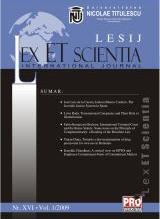THE INTEGRATIVE TENDENCIES OF THE CIVIC CULTURE IN THE AGE OF GLOBALIZATION
THE INTEGRATIVE TENDENCIES OF THE CIVIC CULTURE IN THE AGE OF GLOBALIZATION
Author(s): Elena NedelcuSubject(s): Social Sciences
Published by: Universitatea Nicolae Titulescu
Keywords: civic culture; social inclusion; multicultural and intercultural societies; mondialization; aggregate sovereignty
Summary/Abstract: The aim of this paper is to explore the role of the civic culture and education in the globalization era. Recent sociological studies (G. Devin and others) infirm Norbert Elias’ hypothesis according to which the multiplication and the complicate “interdependent connexions” established generate a mechanical tendency towards the integration and even unification of the international communities. One has noticed that the mentioned interdependent relations lead to stable integration forms only if they are supported by an appropriate axiological-normative system: values, beliefs, democratic procedures. In other words, European integration must be supported by a political culture founded on knowledge, communication, civic involvement and tolerance. The major role attributed to civic culture in accomplishing social inclusion and in creating a “common identity” in the globalization era encourages and justifies the deep and multidimensional analysis that it is subject to, as well as it reveals the importance of performing research work in this field, thus bringing solid arguments for my option. The process of revealing its specific characteristics in a society that has experienced a tough transition process marked by an accentuated anomical state – as the Romanian society has – is not only epistemically but also socially and pragmatically useful. The results of the political culture pattern can direct the evolution and the intensity of the civical socialization process. In the first part of the paper I will analyse the “aggregate sovereignty” concept in the age of mondialization and in the second part, the interdependencies between democracy and social inclusion.The third part explore integrating tendencies of civic culture in the globalization era.
Journal: LESIJ - Lex ET Scientia International Journal
- Issue Year: XVI/2009
- Issue No: 1
- Page Range: 447-457
- Page Count: 11
- Language: English

